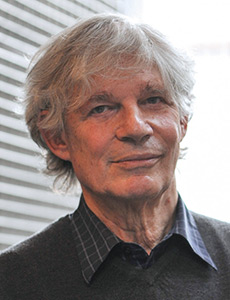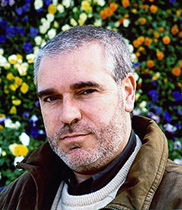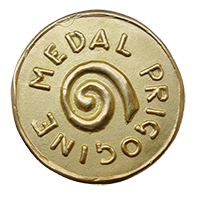 The Prigogine Medal Ceremony for the presentation of the 2020 and 2021 awards were due to take place during the Air Pollution 2021 conference. However, the ceremonies were postponed to 2022 due to COVID-19
The Prigogine Medal Ceremony for the presentation of the 2020 and 2021 awards were due to take place during the Air Pollution 2021 conference. However, the ceremonies were postponed to 2022 due to COVID-19
The Prigogine Award was established by the University of Siena and the Wessex Institute of Technology in 2004 to honour the memory of Professor Ilya Prigogine, Nobel Prize Winner for Chemistry.
Ilya Prigogine
Ilya Prigogine was born in Moscow in 1917 and obtained his undergraduate and graduate education in chemistry at the Free University in Brussels. He was awarded the Nobel Prize for his contribution to non-equilibrium thermodynamics, particularly the theory of dissipative structures. The main theme of his scientific work was the role of time in the physical sciences and biology. He contributed significantly to the understanding of irreversible processes, particularly in systems far from equilibrium. The results of his work have had profound consequences for understanding biological and ecological systems.
Prigogine’s ideas established the basis for ecological systems research. The Prigogine Medal to honour his memory is awarded annually to a leading scientist in the field of ecological systems. All recipients have been deeply influenced by the work of Prigogine.
Previous Prigogine Laureates:
2004 Sven Jorgensen, Denmark
2005 Enzo Tiezzi, Italy
2006 Bernard Patten, USA
2007 Robert Ulanowicz, USA
2008 Ioannis Antoniou, Greece
2009 Emilio del Giudice, Italy
2010 Felix Müller, Germany
2011 Larissa Brizhik, Ukraine
2012 Gerald Pollack, USA
2013 Vladimir Voeikov, Russia
2014 Mae-wan Ho, UK
2015 Bai-Lian Larry Li, USA
2016 Brian Fath, USA
2017 João Carlos Marques, Portugal
2018 Stuart Kauffman, USA
2019 Luc Montagnier, Switzerland
2020 Diederik Aerts, Belgium (to be awarded at the 2022 ceremony)
The 2021 Medal will be awarded to Simone Bastianoni, University of Siena, Italy (to be awarded at the 2022 ceremony).
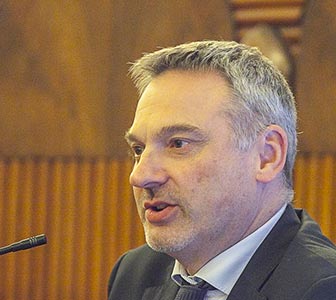 Simone Bastianoni
Simone Bastianoni
After completing classical high school studies, Simone Bastianoni received his master degree in Electronic Engineering at the University of Padova (1990) and then entered the PhD program in Chemical Sciences at the University of Perugia, Italy. During this period, he was visiting scholar at the University of Florida (in 1993) under the supervision of prof. H.T. Odum. He wrote a dissertation on the Development of Novel Thermodynamic Indicators for the Investigation of Ecological Systems under the supervision of Prof. Enzo Tiezzi. He obtained his PhD degree in 1995.
After a career at the University of Siena working in Prof. Tiezzi’s group (with a period as visiting scientist at the Royal Danish School of Pharmacy with S.E. Jørgensen, in 1999), Prof. Bastianoni has been Co-director of the Ecodynamics Group, together with Prof. Nadia Marchettini, since Prof. Tiezzi’s death in 2010. This transdisciplinary group includes chemists, economists, biologists, environmental scientists, architects and engineers (www.ecodynamicsgroup.unisi.it). He is currently full professor of Environmental Chemistry, Chair of the PhD School in Environmental, Geological and Polar Sciences and Provost for Sustainability at the University of Siena.
Prof. Bastianoni has 30 years of experience in investigating sustainability indicators, adopting a holistic view, common to thermodynamics and ecology, including the evaluation of eMergy, eXergy, Ecological Footprint, Life Cycle Assessment (LCA), and greenhouse gases balance. He has identified the relationship between emergy and exergy as a key indicator for understanding the degree of organization of ecosystems and then enlarged this understanding to an input-state-output view of both ecosystems and human ones with applications to sustainability. He has also developed, with other colleagues at the University of Siena. a method for a fast estimation of the greenhouse gases emissions attributed according to a consumer responsibility and a 3D view of the Ecological Footprint that discriminates flows and stocks.
Prof. Bastianoni is a past President of the Emergy Society, Member of the Standard Committee of the Global Footprint Network and Member of the Scientific Board of the International Society of Ecological Modelling. After directing the project that has led the province of Siena to be the first territory of the world to be certified for its greenhouse gases balance, he is now President of the Siena Alliance for Carbon Neutrality (www.carbonneutralsiena.it).
He has published more than 200 papers, with an H-index of 46 (Google Scholar). He is also co-author of several monographs, including:
- Jørgensen S.E., Fath B.D., Nielsen S.N., Pulselli F.M., Fiscus D.A., Bastianoni S., 2015. Flourishing within limits to growth - Following nature’s way, Routledge, Padstow, UK, 288 pp.
- Pulselli F.M., Bastianoni S., Marchettini N., Tiezzi E., 2008. The road to sustainability, WIT Press, Southampton, UK; 197 pp.
In 2004 he received the first Prigogine Junior Medal.
Special Prigogine Lecture
on
A Sustainability Viewpoint for a Post Covid-19 Pandemic Society
to be delivered by Professor Simone Bastianoni
at the University of Santiago de Compostela, Spain,
on Wednesday 1st September 2021
A few years ago we published a paper in which we showed a “functional” way of representing sustainability. In reality, it shows the cause-effect relationships between the environmental, social and economic spheres. The environment forms the basis of the system on which man as a species and like all other species is founded and lives. Human society is the core of our interest, and for which we aim at sustainability: nature without humans would go on quite well. The economy represents the "tip of the iceberg" of human society, its productive expression, its "useful output", the expression of how social organization uses resources to make money. At a time when the environmental and social aspects have become equally urgent and with very rapid and equal response times in the three spheres, it is even more important to understand the mechanisms that can lead us out of contradictions and into a more livable world.
The covid-19 pandemic has shown the cause-effect dynamics: a wrong use by humans of the environment (contact with wild animals that should have been be left alone) has triggered a real environmental crisis, i.e. spillover effect. The environmental crisis quickly became a social crisis because the pandemic spread everywhere and caused the need for lockdowns: being "social" suddenly has become a problem. This caused the economic crisis: without a functioning society, production becomes much more difficult. Our interpretation of sustainability in terms of cause-effect relationships already had this type of prediction.
The environment is also recognized as the most important risk factor for the economy also by the World Economic Forum 2020, according to which climatic change, overuse of resources, loss of biodiversity, viruses or new threats to agricultural production are most likely to produce economic crises. Therefore policies that focus only on the economic side, thinking or hoping that the feedback on societies and on the environment will be positive, will turn out to be a hoax. It was probably a model that could fit in an “empty world”, in which the environment could be considered abundant and substantially unchangeable by human actions, not in a 7 billion inhabitants Anthropocene.
The answer is in a model that does not involve a trade-off between good economic performance, good social cohesion and a simply "clean" environment. It envisages managing at the same time the environmental, social and economic aspects as a whole, with a legislative system that recognizes this whole and regulates human actions both towards the economy and towards the environment, to be recognized as an integral part of the system of support of humankind.
In this model there is no room for feedback that is harmful: what comes "back" from the economy and society must be additional nourishment for the environment, reinforcement, not "pollution". The example of plastic in seas and oceans in this sense is striking and despite the fact that scientists have reported this phenomenon for decades, today those who eat fish also eat plastic. Like those who eat meat and vegetables very often also eat antibiotics and pesticides, respectively.
In exiting the COVID emergency we must keep this dynamic in mind. If the solution to get out of the obvious economic crisis is simply to "increase consumption" we will face even greater disasters. Increasing consumption will imply an escalation in environmental stress and therefore a further loss in the quality of life of people, in addition to an intensification in (as already mentioned by the WEF) also economic risks due to environmental problems. The priority of governments must then be the use of the enormous financial resources, made available also by central banks, for the restructuring of the economy together with its physical and social foundations.
Starting from the observation of humanity, as a dissipative structure, is bound to consume energy and resources, our model indicates a precise path, which is also a path of great human and technological development.
For further information about the Prigogine Awards, please contact:
Prigogine Award
Wessex Institute
Ashurst Lodge, Ashurst
Southampton
SO40 7AA, UK
Tel: +44 (0) 238 029 3223
Email: wit@wessex.ac.uk
See the following Web pages for details of the recent Prigogine Awards:
Further details of all Prigogine Awards can be found on our dedicated page: Prigogine Award
 Diederik Aerts
Diederik Aerts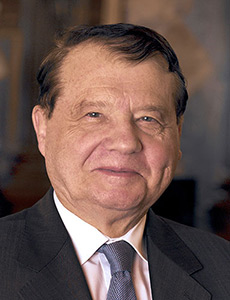 LUC MONTAGNIER
LUC MONTAGNIER